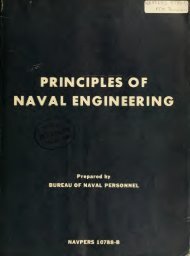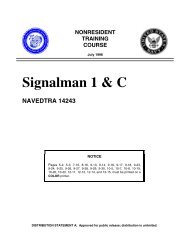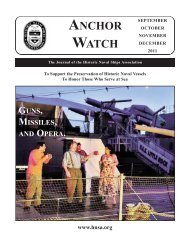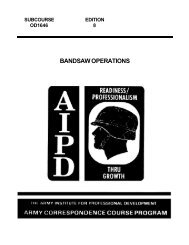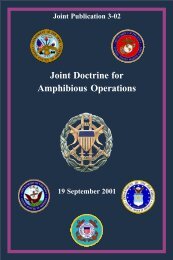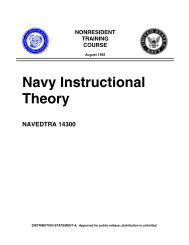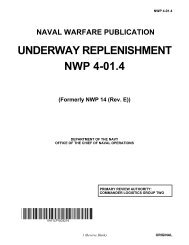OPNAVINST 1710.7A - Historic Naval Ships Association
OPNAVINST 1710.7A - Historic Naval Ships Association
OPNAVINST 1710.7A - Historic Naval Ships Association
Create successful ePaper yourself
Turn your PDF publications into a flip-book with our unique Google optimized e-Paper software.
<strong>OPNAVINST</strong><br />
15 Jun 2001<br />
171O.7A<br />
CHAPTER 5<br />
Toasting<br />
Toasting is a means of expressing good will towarcl others on a social occasion. It may<br />
take place at receptions, dinners, dining-ins or wetting-down parties.<br />
Toasting originated with the English custom of flavoring wine with a piece of browned<br />
and spiced toast. In 1709 Sir Richard Steels wrote of a lady whose name was supposed to flavor<br />
wine liked spiced toast. Thus evolved the notion that the individual or institution honored with a<br />
toast would add a flavor to the wine.<br />
Today we honor individuals and/or institutions by raising our glasses in a salute while<br />
expressing good wishes and drinking to that salute. Etiquette calls for all to participate in a toast.<br />
Even nondrinkers should at least raise the glass to their lips.<br />
Those offering a toast, men or women, should stand, raise their glass in a salute while<br />
uttering the expression of good will. Meanwhile, the individual(s) being toasted should remain<br />
seated, nod in acknowledgment, and refrain fi-om drinking to one’s own toast. Later, they may<br />
stand, thank the others, and offer a toast in return.<br />
The one who initiates the toasting is the host at a very formal occasion, Mr.<br />
Vice/Madame Vice at a dining-in, or any guest when the occasion is very informal. The subject<br />
of the toast is always dependent upon the type of occasion. General toasts would be “To your<br />
health,” or to “Success and happiness,” while special occasions such as weddings and birthday<br />
would require toasts more specific in nature such as “To Mary and John for a lifetime of<br />
happiness and love” in the case of a wedding, or on a birthday “May your next 25 years be as<br />
happy and successful as your first 25 years.”<br />
CEREMONIAL<br />
TOASTS<br />
When the formality of ceremonial toasts is to be observed on state occasions, the order<br />
and subject of all toasts should be arranged beforehand between the host arid his/her ranking<br />
foreign guest. The host initiates such toasts, during or after dessert wine is served. The<br />
experienced guest is always careful to leave enough champagne in his/her glass toward the end<br />
of the meal to be able to join in several toasts.<br />
A toast to a Chief of State is always drunk standing. The toast to the ruler of a country of<br />
a foreign guest of honor is always the first toast proposed on a state occasion. A few minutes<br />
after the guests have seated themselves again, the senior representative of the country honored<br />
rises and proposes a toast to the ruler of the host’s country. All guests rise again to drink this<br />
toast.<br />
These initial toasts may be followed by others to the countries or the services represented<br />
by the guests, and/or the guest of honor and the host. All guests rise again to drink this toast.<br />
When the occasion is an official and formal one, the order and subject of all toasts should<br />
be arranged before hand. It is the responsibility of the host to inform the guest of honor which<br />
toasts will be offered and when. The rule here is that the host proposes all toasts and the guest<br />
answers in kind.<br />
5-1<br />
Enclosure (1)




